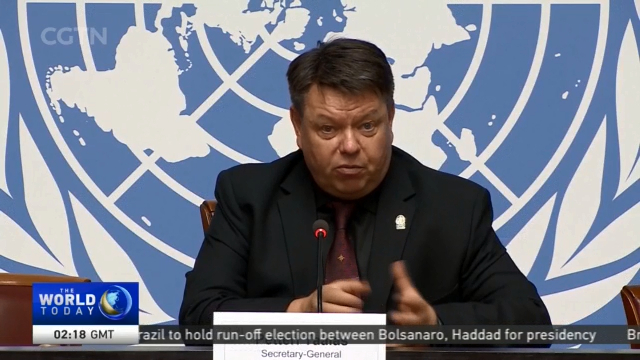
11:04, 09-Oct-2018
UN Climate Report: Scientists predict severe weather changes and food shortages
Updated
10:30, 12-Oct-2018
03:08

A warning from the world's leading scientists on climate change. Their UN report predicts a "catastrophe" if nothing is done to ease the effects of global warming. It also warns the world could face severe weather changes and food shortages by 2040. Our UN correspondent Liling Tan has the details.
The world is warming at a faster rate than previously thought, and drastic measures are needed to cool it down, according to the new widely-cited climate study.
The report from the UN Intergovernmental Panel on Climate Change warned that the 2-degree target set by the Paris Climate Accord of 2015 does not go far enough. Instead, the world needs to limit global warming to 1.5 degrees within 12 years.
PETTERI TAALAS SECRETARY-GENERAL, WORLD METEOROLOGICAL ORGANIZATION "There will be 420 million people less suffering because of climate change if we would be able to limit the warming to 1.5-degree level and we have certain areas in the world which are extremely sensitive: there are small island states, Mediterranean region and also sub-Saharan Africa is already suffering and will suffer more."
Today, the Earth has already warmed to one degree Celsius higher than pre-industrial levels, which means there's only about half a degree to go, half a degree that could separate hope from catastrophe caused by extreme weather, wildfires, droughts and floods, food scarcity and widespread poverty.
The study involved 91 scientists from 40 countries analyzing over 6,000 scientific sources. It found that the difference of half a degree could halve the rate of habitat loss for animals, insects and plants; significantly reduce coral reef destruction; and slow down the melting of Arctic sea ice.
LILING TAN NEW YORK "Limiting global warming to 1.5 degrees is technically possible, say the authors of the report, but may be politically challenging. Especially when major greenhouse gas emitting countries aren't on board. The United States, for example, has withdrawn from the Paris Climate Accord, and Brazil may elect a president who plans to do the same."
Climate scientists say deeper cuts in greenhouse gas emissions are needed, as well as more investment in clean energy, a whopping $2.4 trillion dollars in clean energy EVERY year for the next 17 years to be exact while cutting the use of coal-fired power to nearly zero by 2050.
PETTERI TAALAS SECRETARY-GENERAL, WORLD METEOROLOGICAL ORGANIZATION "This is our challenge. We produce today 85% of the global energy based on fossil energy, coal, oil and gas and only 15% based on non-carbon sources, nuclear hydro and renewable."
The scientists say it is now up to governments to decide whether to act. Liling Tan, CGTN, New York.

SITEMAP
Copyright © 2018 CGTN. Beijing ICP prepared NO.16065310-3
Copyright © 2018 CGTN. Beijing ICP prepared NO.16065310-3